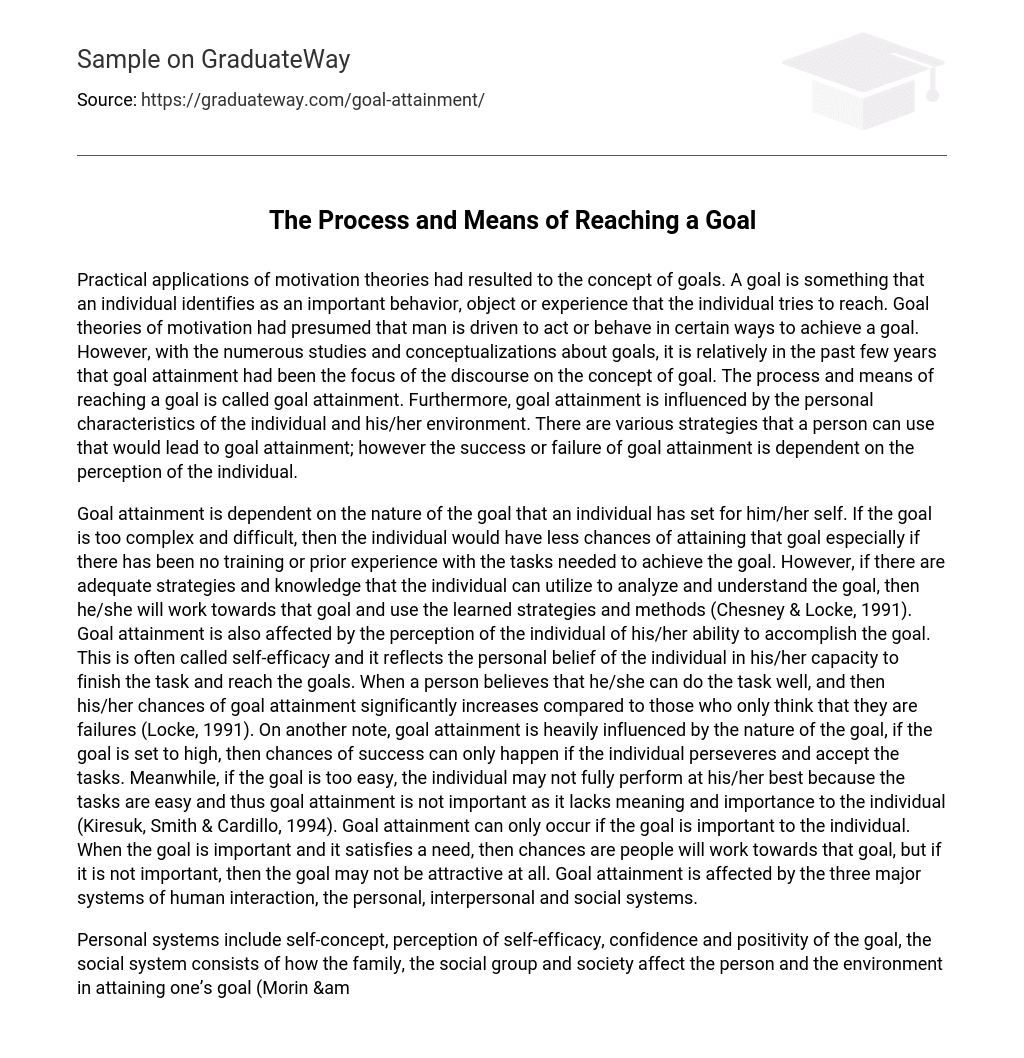Practical applications of motivation theories had resulted to the concept of goals. A goal is something that an individual identifies as an important behavior, object or experience that the individual tries to reach. Goal theories of motivation had presumed that man is driven to act or behave in certain ways to achieve a goal. However, with the numerous studies and conceptualizations about goals, it is relatively in the past few years that goal attainment had been the focus of the discourse on the concept of goal. The process and means of reaching a goal is called goal attainment. Furthermore, goal attainment is influenced by the personal characteristics of the individual and his/her environment. There are various strategies that a person can use that would lead to goal attainment; however the success or failure of goal attainment is dependent on the perception of the individual.
Goal attainment is dependent on the nature of the goal that an individual has set for him/her self. If the goal is too complex and difficult, then the individual would have less chances of attaining that goal especially if there has been no training or prior experience with the tasks needed to achieve the goal. However, if there are adequate strategies and knowledge that the individual can utilize to analyze and understand the goal, then he/she will work towards that goal and use the learned strategies and methods (Chesney & Locke, 1991). Goal attainment is also affected by the perception of the individual of his/her ability to accomplish the goal. This is often called self-efficacy and it reflects the personal belief of the individual in his/her capacity to finish the task and reach the goals. When a person believes that he/she can do the task well, and then his/her chances of goal attainment significantly increases compared to those who only think that they are failures (Locke, 1991). On another note, goal attainment is heavily influenced by the nature of the goal, if the goal is set to high, then chances of success can only happen if the individual perseveres and accept the tasks. Meanwhile, if the goal is too easy, the individual may not fully perform at his/her best because the tasks are easy and thus goal attainment is not important as it lacks meaning and importance to the individual (Kiresuk, Smith & Cardillo, 1994). Goal attainment can only occur if the goal is important to the individual. When the goal is important and it satisfies a need, then chances are people will work towards that goal, but if it is not important, then the goal may not be attractive at all. Goal attainment is affected by the three major systems of human interaction, the personal, interpersonal and social systems.
Personal systems include self-concept, perception of self-efficacy, confidence and positivity of the goal, the social system consists of how the family, the social group and society affect the person and the environment in attaining one’s goal (Morin & Latham, 2000). The most important aspect of goal attainment in the interpersonal or group interaction as a goal is always related to someone else’s actions, behavior and possibly their own goals. An individual who firmly believes in his capability to attain a goal, and along this path he meet other people who help in working towards the goal and the society approves of that goal, then the success of goal attainment is within reach. But if the person has negative views about the goal and himself, doubt the intentions of people who want to help them and society frowns upon that goal, then failure looms in attaining the goal.
Goal attainment, like everything else in this world has been reduced into simple guides and software but the reality is, not all goals are equal and not all people behave in the same way. Thus, the success or failure of one’s ability to attain one’s goal is tied to how a person views him/her self and his/her environment.
References
Chesney, A. & Locke, E. (1991). An examination of the relationship among goal difficulty,
business strategies, and performance on a complex management simulation task. Academy of Management Journal, 34, 400–424.
Kiresuk, T. Smith, A. & Cardillo, J. (1994). Goal Attainment Scaling – Applications,
Theory and Measurement. Michigan: Lawrence Erlbaum Associates Publishers.
Locke, E. (1991). Goal theory vs. control theory: Contrasting approaches to understanding work
motivation. Motivation and Emotion, 15, 9–28.
Morin, L. & Latham, G. (2000). Effect of mental practice and goalsetting as a transfer of training
intervention on supervisors’ self-efficacy and communication skills: An exploratory study. Applied Psychology: An International Review, 49, 566–578.





